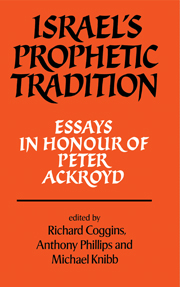Book contents
- Frontmatter
- Contents
- Preface
- Biographical note
- Abbreviations
- Note
- Prophecy in the ancient Near East
- The origins of prophecy in Israel
- Three classical prophets: Amos, Hosea and Micah
- The Isaiah tradition
- An alternative prophetic tradition?
- Visionary experience in Jeremiah
- The Ezekiel tradition: prophecy in a time of crisis
- The prophets of the restoration
- Prophecy and the emergence of the Jewish apocalypses
- Prophecy and wisdom
- Prophecy and the cult
- Prophecy and law
- A change of emphasis in the study of the prophets
- Martin Buber and the interpretation of the prophets
- Index of Biblical References
Prophecy and wisdom
Published online by Cambridge University Press: 09 January 2010
- Frontmatter
- Contents
- Preface
- Biographical note
- Abbreviations
- Note
- Prophecy in the ancient Near East
- The origins of prophecy in Israel
- Three classical prophets: Amos, Hosea and Micah
- The Isaiah tradition
- An alternative prophetic tradition?
- Visionary experience in Jeremiah
- The Ezekiel tradition: prophecy in a time of crisis
- The prophets of the restoration
- Prophecy and the emergence of the Jewish apocalypses
- Prophecy and wisdom
- Prophecy and the cult
- Prophecy and law
- A change of emphasis in the study of the prophets
- Martin Buber and the interpretation of the prophets
- Index of Biblical References
Summary
In discussing the relationship between any two things it is essential to have a clear idea of the nature of the two things to be compared, and if the discussion is to be a useful one it is necessary to find satisfactory working definitions for both of them. Unfortunately these conditions are not fulfilled when the relationship between prophecy and wisdom is the subject to be considered. If, as will be indicated below, scholarly treatments of this subject have produced a great variety of conclusions, some of them mutually incompatible, this is due for the most part to the fact that the meaning of the word ‘wisdom’, as used in Old Testament contexts, has been a matter of wide disagreement. Some attention must consequently first be paid to this problem before the relationship of ‘wisdom’ to the more easily definable concept ‘prophecy’ can be described.
It is well known that in the Old Testament the word ‘wisdom’ has a specialised as well as a general sense. The Hebrew word ēokmāh, when it occurs in the Old Testament, often means no more than ‘common sense’, ‘brains’. In some passages it is better translated by ‘ability’, ‘skill’, ‘technique’. But that a more specialised meaning is to be found in some books was recognised at a very early date, as is shown by the titles given to certain Biblical or Apocryphal books: Ecclesiasticus was known as ‘The Wisdom of Jesus son of Sirach’, the Apocrypha contains the Wisdom of Solomon, and Proverbs is referred to in Tosephta on Baba Bathra 14b as ‘The Book of Wisdom’, while in the Roman Missal the readings from certain books – Ecclesiasticus, Proverbs, Wisdom of Solomon and the Song of Solomon – are introduced by the heading ‘Lectio Libri Sapientiae’.
- Type
- Chapter
- Information
- Israel's Prophetic TraditionEssays in Honour of Peter R. Ackroyd, pp. 181 - 199Publisher: Cambridge University PressPrint publication year: 1982



